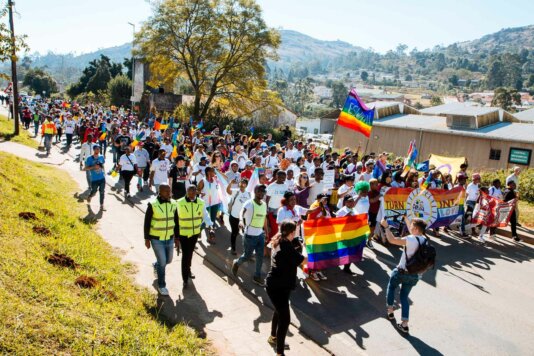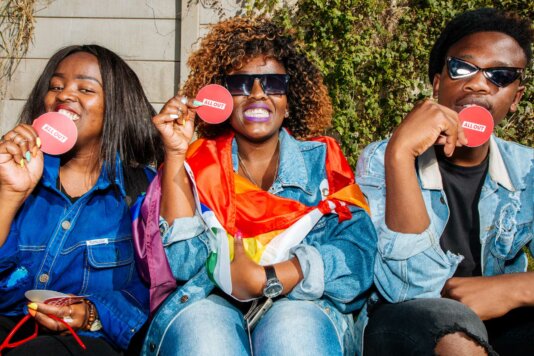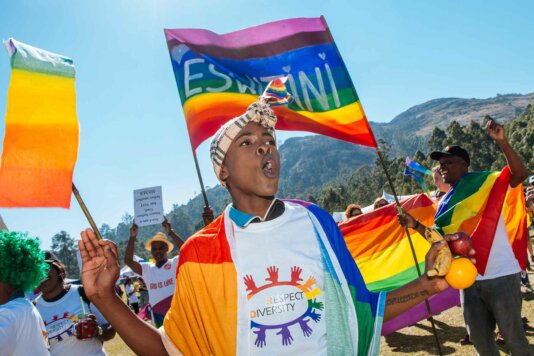- About
- Topics
- Picks
- Audio
- Story
- In-Depth
- Opinion
- News
- Donate
- Signup for our newsletterOur Editors' Best Picks.Send
Read, Debate: Engage.
| December 04, 2020 | |
|---|---|
| topic: | LGBT Rights |
| tags: | #LGBTQ Rights, #Eswatini, #petition, #NGO, #activism, #healthcare, #colonialism |
| located: | Swaziland |
| by: | Yair Oded |
Asanda’s testimony is part of a project titled Voices of Eswatini: an initiative by AllOut that sheds light on the experience of queer people in the Southern African kingdom of Eswatini, where same-sex intimacy is still outlawed.
The project
The project features the stories of 16 queer people of different sexual orientations and gender identities who share in their own words what it is like to be queer in Eswatini, the ways in which the anti-gay law spawns discrimination and violence against them, and how they envision the future for the LGBTQ community in the kingdom.
“AllOut very much focuses on storytelling of personal stories of LGBT+ people around the world, of [their] lived experiences”, Mathias Wasik, AllOut’s director of programs, told FairPlanet.
After conducting a similar project in Kenya last year, the organisation decided to turn the concept into a series, Wasik added.
“Hardly anyone would know of any LGBT+ people from Swaziland and their stories,” Wasik said, emphasising that in such projects AllOut seeks to showcase “voices that go unheard otherwise and giving them a platform […] so they can be heard beyond their own borders.”
“The idea is to show that the question of legalisation is not a technical question or a purely legal matter, but that real people are getting hurt and suffer from these laws,” Wasik added. ”We want to share their stories with the world: stories of pain, stories of hope, to basically give them a voice to be really heard everywhere in the world, and hopefully start a conversation that will then feed back to Eswatini and help ignite some change in the country.”
AllOut’s involvement in Eswatini dates back to 2018, when it supported fundraising efforts to help make the kingdom’s first-ever Pride march a reality. AllOut then established partnerships with the few groups advocating on behalf of the queer community in Eswatini, one of them being Eswatini Sexual and Gender Minorities (ESGM) - the only official LGBTQ organisation currently operating in the kingdom. In early 2020, the two organisations teamed up to work on the Voices of Eswatini project, with ESGM providing the testimonies of the 16 individuals.
“Our LGBT movement is always eager to put [queer people’s] voices to the front, to make sure that our issues are being discussed,” said Melusi Simelane, founder and executive director of ESGM, in an interview with FairPlanet. “We are excited to see it finally being launched, so that people see their voices being shared within larger spaces unlike just being shared in small silos and in hiding.”
Homophobia plagues Swazi society
After gaining independence, Eswatini - a deeply conservative country - had held on to a relic of colonial rule outlawing same-sex conduct, making it one of almost 70 countries in the world where being gay is illegal. While the anti-gay law isn’t presently enforced in Eswatini, it nonetheless perpetuates sentiments of homophobia and transphobia in the kingdom and sanctions discrimination against queer people in all spheres of life.
The rhetoric espoused by some of Eswatini's top state and religious leaders further contributes to the spread of hate. “It is a country where the current king reportedly described homosexuality as Satanic in the past; a former prime minister described homosexuality as an abnormality and a sickness,” Wasik of AllOut said. Such sentiments, buttressed by the law criminalising same-sex conduct, legitimise the exclusion of LGBTQ people from healthcare services, employment, and housing, and spawn an overall hostile environment for members of the community.
According to a 2019 study, over 30 percent of queer people in Eswatini reported having been denied healthcare services, 50 percent of them claimed they were survivors of sexual violence, and 25 percent said they had attempted suicide. A different report from 2019 further indicates that the ongoing oppression of the LGBTQ community has engendered a grave mental health crisis among queer people in Eswatini.
Their voices
The participants in AllOut’s project do not only delineate the various types of anti-queer discrimination prevalent in Eswatini, but also personalise them and convey the ways in which the criminalisation of same-sex intimacy affects their daily lives and overall wellbeing.
Several of the participants describe having had difficult experiences with family members who rejected them on account of their sexual orientation or gender identity. Coming out to families, a process that can prove to be challenging across the board, becomes even harder in Eswatini’s climate of homophobia and transphobia. “[The anti-gay law] has delayed acceptance from the community in general, overlapping to the families,” Phumelele Dlamini, a transgender man who participated in the project, told FairPlanet. “A lot of the LGBTI persons have been turned against by their families due to the fear of the community's reaction once it is out in the open that a family member is in fact LGBTI.”
In some instances, the family’s resentment can amount to mental abuse and threats of violence. Such was the case of Rainbow, another participant of the project who identifies as a lesbian woman. “My mother didn’t take it easy, she even promised to kill me, she promised to chase me away,” Rainbow recalls in her testimony, referring to her coming out moment. “She told me that homosexuality is forbidden in my country and people won’t accept me, they will hate me, I won’t get jobs, that I need to pray to the Lord to change my sexual orientation.”
A number of the participants shared experiences of discrimination they endured in the workplace. “Since I am a transman who is only socially transitioned, I am forced to wear a skirt to work, which is the most discrimination I face each day,” Dlamini told FairPlanet. “With my colleagues it’s usually the same in all the different work stations I've been to - at first I experience a lot of discrimination, hate speech and the likes. Fortunately through the trainings I've had with ESGM, I have been able to handle the situation, do a little bit of advocacy here and there and the end result is usually favourable.”
Healthcare is another sphere in which many of the participants have been discriminated against.
Mpolweni, a gay man, shared that “Sometimes [...] at health facilities, just like when I had to start my ART [antiretroviral therapy], it was difficult. One thing the nurse asked me was, ‘Where is your girlfriend?’ And I said to her ‘I don’t a have a girlfriend, I have a boyfriend, I’m gay’. She just went out on me.”
This atmosphere of discrimination and hate can lead, in some cases, to violent attacks against members of the LGBTQ community. “I was walking home from some bar and I guess I was followed because they know me, and they saw me, and they know my sexuality, so they followed me and attacked me,” PK, a transgender man, shared in his testimony. “We did report and the case had to go to court but, unfortunately, it was thrown out.” PK’s friend Kilo, a lesbian woman, was murdered in an attack a few years earlier in the small town of Nhlangano due to her sexual orientation.
According to Simelane of ESGM, much of the discrimination and violence find their roots in the colonial-era anti-gay law. “At least for some of us […] almost everything that we go through is because of the common law offence of sodomy, it’s the only thing that holds us back,” he told FairPlanet. “That law will always catch up with you,” he added, “You don’t get employment opportunities, equally you don’t get promotion opportunities if you are employed, you don’t get opportunities in the education system […] even in the housing market you can’t get the same opportunities, in the economy you can’t compete fairly as an LGBT person. So you find that everything [...] then goes back to the common law offence of sodomy because when all of these things happen and then you are trying to get protection you are not going to get protection because you are an LGBT person.”
NGOs are making a difference
Despite the hostile environment towards LGBTQ people in the kingdom, activists and organisers have managed to band together and provide much needed support for the community.
ESGM has been denied registration from the state due to the anti-gay law, but the former is engaged in a legal battle against the registrar in order to be able to officially register as a nonprofit.
Even without official recognition from the state, ESGM has been advocating on behalf of queer people and working to decriminalise same-sex conduct in the kingdom. To date, they have held two national LGBTQ conferences, lobbied government officials, conducted various trainings, and embarked on an awareness building and education campaign.
“ESGM has also been able to forward assistance to affected members during the COVID-19 pandemic by issuing relief food parcels, continuously giving sanitary towels and other commodities such as condoms and lubricants,” Dlamini told FairPlanet.
While ESGM is currently the only official LGBTQ advocacy organisation in Eswatini, other organisations have also been providing crucial services and support to members of the community. One area in which their work has begun to make a difference is in the health sector.
“Accessing services like going to a general hospital – back in the years it was kind of difficult because you’d be maybe questioned for accessing that kind of service,” said Lobbs, a transgender man, in his testimony for the Voices project, “but now we have these organisations that actually specifically deal with LGBTQ. It is much easier for me to go and test for example without being discriminated and all that.”
The participants’ testimonies reveal a great resilience among LGBTQ people in Eswatini, which grows all the more potent as grassroots efforts and NGOs further unite the community. This was evident in 2018 when activists organised Eswatini’s first Pride march.
Initially, the organisers of the march faced a significant backlash from the state and media. “The police didn’t want us to hold the march, they didn’t want us to get the security, they were repeating horrible things on the national media and we were having international hate groups writing petitions and pretending to be local,” said Simelane of ESGM, who played a key role in organising the event. “So we were just being attacked from all angles.”
Despite facing mounting pressure, the organisers refused to back down. “We were confident that the law was on our side,” said Simelane, “and the Human Rights commission was protective of us in terms of ensuring the government is aware that what we’re doing is within the confines of the law [...] no matter what they were bringing to us we just stood up to them and said - what law are we breaking?”
The 2018 Pride march, which was financially supported by AllOut, ended up being a success. “In the follow up of the pride event, we bought some newspapers the next day, and all of the newspapers had very positive coverage of the event,” Wasik of AllOut told FairPlanet. “It was interesting to see the same newspapers that reported in such a negative way before, suddenly turned around because they realised there was nothing really to worry about.” A second Pride march ensued the following year.
Commenting on the possible explanations as to why the pride events in Eswatini were as successful as they were, Wasik presumed that “If you go beyond the legacy of colonial burden that has been put on the country, society itself might not be as homophobic as you think, and these resentments and those views might not sit so deeply within people.” “And that’s where I think you might have an opening in a way to convince people to be open minded and to include LGBT+ people more," he added. "Storytelling and showing the community through pride events, through public events, through project like Voices of Eswatini, might be a way to just fight that narrative that still creates such a problem for LGBT people in the country.”
Simelane echoed similar sentiments, and emphasised the importance of promoting awareness among the public and changing the narrative around the LGBTQ community. “It’s almost always going to be the state that perpetuates the hate and perpetuates the violence,” he said, “and if then the state wins the narrative then you probably will see some violence happen. But if you are consistent with your messaging, then you are able to win the conversation in that sense.”
On the path to equality
As queer people continue to unite across Eswatini, the goal of achieving true equality in the kingdom seems less like a far fetched, quixotic dream and more like a tangible prospect. “We are growing, we are learning with each and every activity that we have,”’ said Simelane, conveying a sense of optimism for the future of LGBTQ people in Eswatini.
“The fact that some government structures have begun hosting consultative meetings with the various LGBTI consortiums alongside their members is a step in the right direction,” Dlamini, who participated in the Voices project, told FairPlanet, adding that, “The ongoing court case between ESGM and the registrar of companies in Eswatini upon refusing to register ESGM as a nonprofit organisation under the impression that the company's objectives are ‘unlawful’ has also starred up a conversation from the general public, which I feel may work in favour of the movement of the LGBTI community.”
“I believe they will register ESGM,” Naomi Dups Dupont, a woman who took part in the project, told FairPlanet. “The laws will change [...] It will happen but it takes time,” she said, adding that “I believe people will show us the respect we deserve if we start giving ourselves that respect that we deserve.”
In a bid to pressure the state to decriminalise same-sex relations, AllOut, with the support of ESGM, has launched a petition calling on Eswatini’s Ministry of Justice and Attorney General to overturn the common law offence of sodomy. The petition has so far garnered over 19,000 signatures.
In the meantime, as the efforts to abolish the common law offence of sodomy and win official state recognition continue, the community strives to increase its representation in public spheres and make its members more visible and audible. Projects such as Voices of Eswatini are certainly helping. “Voices of Eswatini has indeed raised so much hope that one day our voices will be amplified and heard,” said Dlamini.
“For me, it’s about just making sure that our voices are heard and are shared with the world,” said Simelane as he reflected on the project and its potential to help bring about change. “I always say that once you are able to share your story, even as an individual person, you're already a hero because you are touching lives, you are changing the narrative,” he added. “If you go through the stories that are being shared, sure, a lot of them are sad, but we think that in the whole shadow of sadness it is a silver lining to say that in spite of everything - here we still stand, here we still are, still continuing to want to fight for our existence.”
By copying the embed code below, you agree to adhere to our republishing guidelines.



